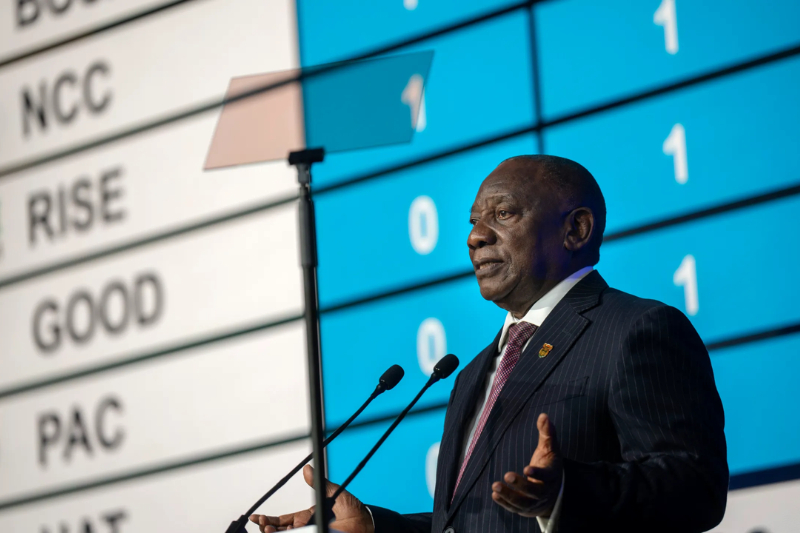As the African National Congress (ANC) tackles the hitherto unheard-of chore of choosing a coalition partner to rule South Africa, the country is on edge. Last week’s election saw the ANC lose its parliamentary majority, the first time in thirty years of democracy it has failed to get more than half of the vote.
Historic Results of Elections
The ANC had easily secured every election since apartheid ended in 1994. But disappointed voters this time, fed by ongoing unemployment, inequality, and rolling power shortages, awarded the party just 40.2% of the vote—down dramatically from 57.5% in the previous election five years earlier. Although the ANC is still the biggest party, its declining vote share makes it impossible for it to rule by itself, therefore dragging South Africa into unexplored political territory.
President Cyril Ramaphosa remarked in his Monday weekly message, “This moment in our country calls for responsible leadership and constructive engagement.”
Collective Negotiations in Coalition
From the free-market-oriented Democratic Alliance (DA) to the radical Economic Freedom Fighters (EFF) and uMkhonto we Sizwe (MK), a group pushing for the nationalization of mines and banks and land redistribution, the ANC’s possible coalition partners cover a broad political range.
Late on Sunday, following the official results announcement, ANC Secretary-General Fikile Mbalula said: “We would work with anyone who wants to work with us, but not with a cap in the hand.”
A working committee of 27 ANC leaders is scheduled to meet on Tuesday to draft a presentation for the National Executive Committee, which will get together on Wednesday to guide the course forward. Originally set for Monday and Tuesday, respectively, these meetings were postponed. Emphasizing that no disputes had yet surfaced as the meetings had not begun, ANC spokesman Mahlengi Bhengu-Motsiri discounted claims of internal strife.
Keep Reading
Both the smaller Inkatha Freedom Party (IFP) with 3.9% and the DA, which obtained 21.8% of the vote, have set up negotiating teams to interact with other parties. Both are part of a pre-election coalition trying to create a government reflecting the demand of the people for a cooperative leadership style.
“The people of South Africa spoke loudly and clearly that political parties must find each other and comprise a government on their behalf, as they did not give a full mandate to one political party,” said IFP leader Velenkosini Hlabisa.
Political Dynamics and Possibilities for Cooperation
Political experts project difficult negotiations ahead. Director of the School of Public Leadership at Stellenbosch University, Zwelinzima Ndevu, pointed out the difficulty in organizing a coalition—especially for the ANC—because of internal conflicts.
Another political expert, Ralph Mathekga, speculated that the DA will probably force the ANC to commit, especially to anti-corruption policies, hence generating conflict within the ANC ranks. “It’s going to be a question as to whether the ANC signs up for anti-corruption or not,” Mathekga added.
Notwithstanding certain challenges, a coalition between the ANC and the DA looks feasible given the DA’s good provincial government record, especially in the Western Cape, home to Cape Town, a significant tourist destination. Director of research at the Mapungubwe Institute for Strategic Reflection, Susan Booysen, thinks the DA has somewhat greater chances than forging a coalition with the ANC.
The prospect of an ANC-DA collaboration has been welcomed by financial markets since the DA’s pro-business policies are favored over those of the EFF or MK. Some of the losses connected to post-election uncertainty have been recovered by the South African rand, stocks, and government bonds.
Although a coalition government looks most likely, other situations are still possible. One could explore a government of national unity, including all major parties, even if this choice might cause instability and deadlock. Alternatively, the ANC might establish a minority administration depending on confidence-and-supply agreements with one or more other parties to back important parliamentary votes.
Under former President Jacob Zuma, the MK party—a wildcard in the election—is led Given the bitter relationship between Zuma and Ramaphosa, a coalition between the ANC and MK is judged improbable even given its good showing—14.6% of the vote. Respected in his own region of KwaZulu-Natal, Zuma is a polarizing figure forced to step down in 2018 amid corruption accusations. Reflecting continuing tensions, MK has said it would contest the election results in court.
Recalling the riots and looting that happened when Zuma was arrested for contempt of court in 2021, analysts have long worried that supporters of Zuma could react violently should they be unhappy with the election result.
The political scene stays turbulent while South Africa waits for the ANC to declare their coalition partner. The choices taken in the next few days will determine the course of the country, therefore affecting social projects as well as economic measures. Within two weeks of the announcement of the election results, the newly elected parliament has to gather; one of its first responsibilities is choosing South Africa’s next president. The result of these discussions will be crucial for determining the stability and advancement of South Africa’s democracy.

